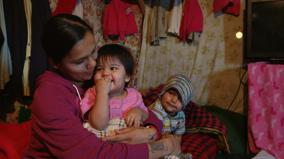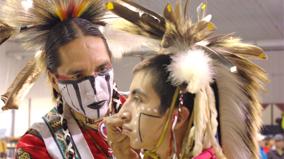Crazywater
This feature-length documentary from Inuvialuit filmmaker Dennis Allen is an emotional and revealing exploration of addiction among Indigenous people in Canada. After years of struggle and shame, 5 Indigenous Canadians bravely come forward with their stories of substance abuse, presenting the sensitive topic of alcoholism in an honest and forthright manner. Alex, Paula, Desirae, Stephen, and Dennis himself maintain a deep and devoted commitment to their traditional culture to achieve long-term sobriety. Through their voices, this insightful doc offers an inspirational beacon of hope for others.

Extras
Details
This feature-length documentary from Inuvialuit filmmaker Dennis Allen is an emotional and revealing exploration of addiction among Indigenous people in Canada.
After years of struggle and shame, 5 Indigenous Canadians bravely come forward with their stories of substance abuse, presenting the sensitive topic of alcoholism in an honest and forthright manner. Alex, Paula, Desirae, Stephen, and Dennis himself maintain a deep and devoted commitment to their traditional culture to achieve long-term sobriety. Through their voices, this insightful doc offers an inspirational beacon of hope for others.-
writerDennis Allen
-
directorDennis Allen
-
producerSelwyn Jacob
-
associate producerTeri Snelgrove
-
editorCarmen Pollard
-
director of photographyKirk Tougas
-
sound designGael MacLean
-
sound supervisionGael MacLean
-
sound recordistChris RodgersJeff CarterJeff HenschelMike Filippov
-
additional photographyAllan CodeMike MckinlayKyle Pigeau
-
digital imaging technicianJonathan Staav
-
motion designerVern Giammartino
-
production managerCatrina Longmuir
-
transcriptionTrace Sitter
-
archival researchFound Images Research
-
music clearancesFound Images Research
-
dialogue editorDoug Paterson
-
re-recording mixerDoug Paterson
-
foley editorJeremy Butler
-
assistant sound editorJeremy Butler
-
music editorGael MacLean
-
post-production servicesFinale Editworks
-
colouristLorne Wright
-
production coordinatorKaren Downing
-
technical coordinatorWes Machnikowski
-
production supervisorKathryn Lynch
-
marketing managerLeslie Stafford
-
program administratorJennifer Roworth
-
centre operations managerJanine Steele
-
executive producerTracey FriesenMichelle van Beusekom
Education
Ages 14 to 18
Diversity - Identity
Health/Personal Development - Substance Use and Abuse/Addiction
Indigenous Studies - Identity/Society
Social Studies - Communities in Canada/World


















